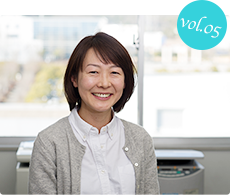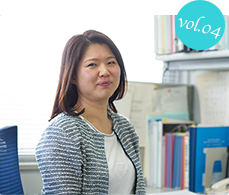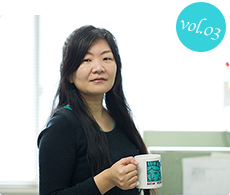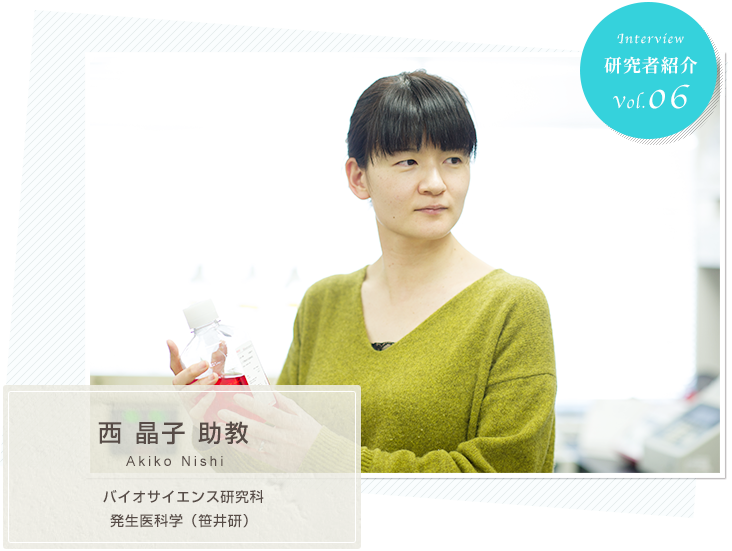
![]()
Completed Ph.D. program in Life Sciences at Saitama University Graduate School of Science and Engineering in 2009. Ph.D. in Life Sciences, Saitama University, Japan. After working as a special researcher at RIKEN Yoshida Chemical Genetics Laboratory and as a researcher at The Francis Crick Institute (Cancer Research UK) in 2010, she has been an assistant professor at the Laboratory of Developmental Medical Science, Graduate School of Biological Sciences, Nara Institute of Science and Technology (NAIST) since October 2015. She specializes in cell biology and molecular genetics. Her current research interests include mechanistic analysis of early neural differentiation using stem cells and functional analysis of cilia involved in development.
Path to becoming a researcher
I liked chemistry and physics until I was in high school, but just before the university entrance exam, I had a chance to talk to my uncle, a marine biologist, and I thought biology sounded more interesting. In 2010, when I started working as a postdoctoral fellow at the National Cancer Institute in the UK, I decided to change my field to cell biology and started working on a project dealing with human cells. I was involved in setting up a project dealing with human cells. In the course of working on collaborative research, I realized that what I was doing was strongly related to the field of embryology, and when the decision was made whether to continue doing the same cell biology or to integrate and do something new, I wanted to try something new and ended up joining the Sasai Lab, a developmental medical science laboratory at TUFS.
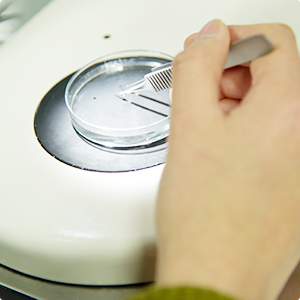
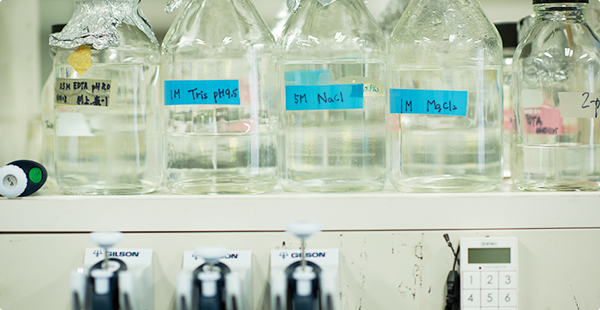
Meeting on Improving the Research Environment @ National Cancer Institute in the UK
At the National Cancer Institute in the UK, half of the board was made up of women, but the percentage of women PIs (principal investigators) was 10-15%, which was still considered low. About three years ago, the PIs started a meeting with the members of the institute to talk about any problems or difficulties that women were having in scientific research. At the meeting, they talked about the usual topics, such as the difficulty of traveling to academic conferences with children and the physical demands of balancing child-rearing and research, as well as specific topics, such as what social systems and financial resources are available to help balance the two. The focus was on finding a good balance, exploring specific solutions, and sharing information. The generations of participants ranged from people in their 60s to people in their 20s, and not all were women. At one point, there was a Nobel laureate, and there were students. Some were married, some had children in non-marital relationships, and some were sent from overseas with their families. These diverse members had the opportunity to discuss what issues needed to be addressed to improve the research environment.
In terms of work efficiency, I feel that there is a big difference between the UK and Japan. In particular, I wonder if administrative procedures could be made more efficient. Nowadays, you need documents to go on a business trip or to buy things, but in the U.K. you just have to get approval from the person who is your supervisor in the system, and it does not take as long as it does in Japan. I would like to save more time and devote it to my own research and discussions with students.

Daily schedule and chores
I arrive at the university between 9:00 and 9:30 a.m., partly because my home is an hour and a half drive from the university. I often concentrate on my own experiments in the morning, and then have more experiments and meetings in the afternoon. I leave the university around 7:00 p.m. and get home around 9:00 p.m. I usually come to the university on either Saturday or Sunday to do experiments, but I have students help me with things like just picking up plates, which is very helpful. My husband and I got married when I was finishing my Ph.D., and we came to England at about the same time. My husband returned to Japan the same year and is now a researcher at another university.
My husband and I share the household chores on a fifty-fifty basis, as we both have flexible working hours. My husband cooks breakfast while I get ready in the morning, I cook dinner and he does the dishes, and we share the responsibility of cleaning on Sundays. However, my husband does the paperwork that needs to be submitted to the government, so perhaps he carries more of the burden. During our time in England, we often traveled together, saying, "Let's go to places we couldn't go if we were in Japan.
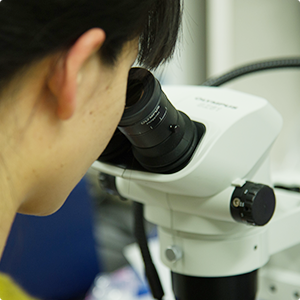
For those who aspire to be researchers in the future
Whether you are an aspiring researcher or not, I think it is better not to think that this is the only plan for the future. For example, if you are going to do a Ph.D., you cannot decide beforehand what you are going to do after the Ph.D., and it seems to me that it is determined by the process. When I myself think about the future, I have been working to find out what I find interesting and what I want to do. I also tell students that they don't have to decide about the future. This does not mean that they have to do nothing, but that they should always think about what they are interested in. In this way they can always think about what they can do, ask others about it, and finally make their own choice. Then you can responsibly stop in the middle of a project. In the meantime, I want you to try different things so that you have many options. I hope you will think more freely and not limit your options.
I also think that studying abroad is a very good option if you want to become a researcher. Maybe there is a fear that once you go abroad there is no place to come back to, but I think it is okay to go out more. Maybe women in particular are more suited to study abroad. There are a lot of female researchers, so I think studying abroad is a good way to broaden your options.
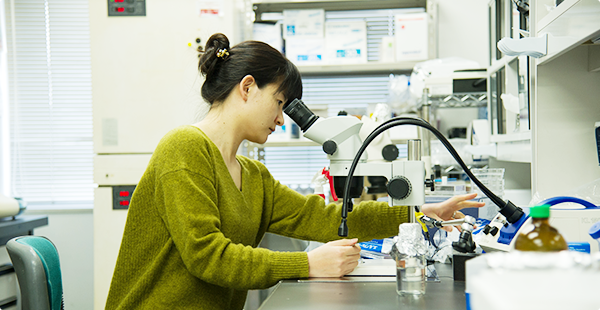
(March, 2017)

-
2017.3 updated
Division of Biological Science
-
2017.3 updated
Division of Biological Science
-
2017.3 updated
Division of Biological Science






